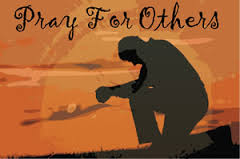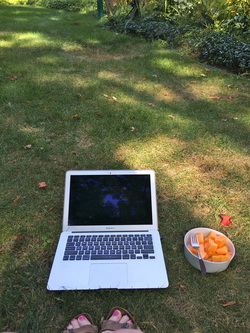
 I am hoping that the folks at the Genius Bar at the Apple Store will answer my prayer. I'm having trouble posting on this blog and am told that I need to clear my cache. Help! I hardly know what that means, much less how to do it.
0 Comments
 I shared with a friend the morning habit my husband and I have of offering to each other something for which we are grateful. Sometimes a small thought—a cup of coffee. Other times an obvious gratitude—friends and family. Often a particular happening—a chance encounter with a friend. My husband and I usually exchange just a sentence. My friend and her spouse take the time to discuss their gratitudes. Those are two of the many ways, but regardless, the daily habit and the offering are sacred. But what about those who live alone? An email or phone call might be the way to go. In fact, I’m going to email a couple of friends right now.  When I think about prayer, I don’t think of success as in winning or losing. I might talk about that another day. Today I want to say that one way to position prayer as successfully pointing to God’s Kingdom, is to stay away from negatives. I don’t just mean while praying, I’m thinking of no negative comments or discussion with others or with myself. I’ve been working on this during the recent deluge of political back and forths. Not easy, but I’m given up trying to protect myself from the flood of negativity.  It may be my Protestant, New England upbringing that makes me feel more at home with the term ‘praying for people’ than with ‘intercessory prayer’. That what I do, pray for people’. It is humbling, keeping me in the mystery, freeing me from judging, helping me pray ‘Thy will be done.” There isn’t a right term. What is important is that I resonate with how I define God’s call.  Here is some more about intercessory prayer. From “Westminister Dictionary of Theological Terms,” by Donald K. McKim. intercession/intercessory prayer (Lat. Intercessio, ‘a coming between,” “intervention”). Prayer offered on behalf of others (1 Tim. 2:1). prayer (From Lat. Precari, “to entreat”) Human approach to God and addressing God in praise and adoration, confession, thanksgiving, supplication and intercession. A consciousness of God’s presence, love, direction, and grace may be experienced. I know these categories, but reading the definitions reinforces the value and importance of being aware of different kinds of prayer. How easy it is for me to jump right into intercessory prayer, although thanks to my mother’s emphasis on gratitude, I am quite accustomed to offering thanks. Starting with praise, adoration and confession, however, doesn’t come easily. I forget. What about supplication, which according to the dictionary seems more general than intercession. Supplication (From supplicare, “to kneel down,” “to pray) The act of praying for someone or something (Eph. 6:18; Phil. 4:6). Maybe when I say I’m praying for people, my prayer is general and non-specific, supplication, whereas intercession is a plea to God to do something, something that I am quite specific about.  Since my last posting three days ago I have been thinking ‘intercession’ while praying ‘the list’. I have been a little more bold with God, and that feels like a good thing. After all, God is above offending, especially when we keep our intention as honest as we can. I have definite ideas on the outcomes that I want for a few people on the list. God can’t blame me for wanting a fifty year old teacher, mother, wife and daughter to be cured of cancer. And what about the fourteen year old who was suddenly struck with a unique brain condition that has left him with very little mobility. Of course I want healing for him. I could go on and on but I’m sure you have your own list and examples. I know prayer makes a difference; I believe in miracles; I accept as true that we co-create with God and that God needs us in the mix. So why not join God and pray for miracles…. Always keeping in mind, Thy will be done.  For years I felt called ‘to pray for people’. That’s the term I’ve used; it felt comfortable and satisfying. Perhaps it shows my Protestant upbringing; praying for people is what we did and how we talked about (if we ever talked about it). Lately, however, and by lately I mean in the past three days, I’ve been considering the term ‘intercessory prayer’ (which I think of as a Catholic or Anglican term, one often used on the Isle of Iona). Here are my thoughts on this beautiful morning as I write and eat cantaloupe . Praying for people is asking for the good, whatever that may be, in a general way. Intercessory prayer, on the other hand, feels more proactive. It suggests that God and I are co-creating, that my prayer makes a difference in a substantive way. Intercessory prayer opens up the possibility of asking God for specific outcomes, which, as I have written about often, I am reluctant to do. For sure, I’ll keep writing about his. As we say in the UCC church, God is still speaking. I guess that means that I have to keep listening.  In the introduction to A Way Without Words: A Guide for Spiritually Emerging Adults, Marsha Sinetar shares the comments of Swami Vivekananda concerning the use of the word ‘God’. Like Sinetar, I prefer the term ‘God’ to such phrases as ‘higher self’ or ‘higher power’. “Because it is the best word for our purpose; you cannot find a better word than that, because all the hopes, aspirations and happiness of humanity have been centered in that word. It is impossible now to change the word. " …Do you mean to say that because some fool says it is not all right, we should throw it away?...Use the old word, only us it is in the true spirit cleanse if of superstition and realize fully what this great, ancient word means." The term ‘God’ does not conjure up negative thoughts in me. I know that the issue of paternalism and masculine biases needs to be addressed on its own. But it is a separate debate, not to be mixed up or confused with humankind’s on-going discernment about God. "God" is here to stay until we figure God out. That’s the way it is with words.  I believe that the prayer I offer makes a difference. I have to believe this or my life purpose would be a sham. I keep hearing that God is calling me to intercessory prayer, as the theological phrase goes, but to me, I just say that I pray for people. I do so for an hour in the morning and then throughout the day. My procedure varies but in general I say the person’s name and surround h/her with God’s love; sometimes I picture the person walking along with Jesus. When my mind starts taking over (a common occurrence) and I judge what ‘should’ happen, I take a few deep breaths, shake off the thought and sink deeper into God’s presence. In rereading this, I realize how inadequately I have described what goes on when I pray; but today, at this moment, it is the best I can do. I try to put it into words because I feel called to help others interested in prayer. I share what I do in the hopes my example will help readers discern their own call. It is difficult to write about prayer. Reading what I just wrote proves the point. Prayer is difficult and mysterious. I get distracted when I pray. I have doubts. Really, where did that call to pray for people come from? Who do I think I am? But I keep going. It has to be a call; but what does that mean? I keep going. |
Contact me
[email protected] Archives
August 2023
Categories
All
|
 RSS Feed
RSS Feed